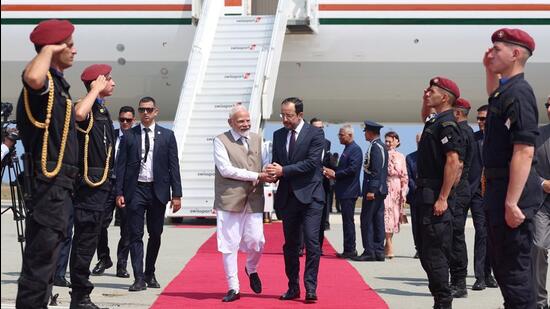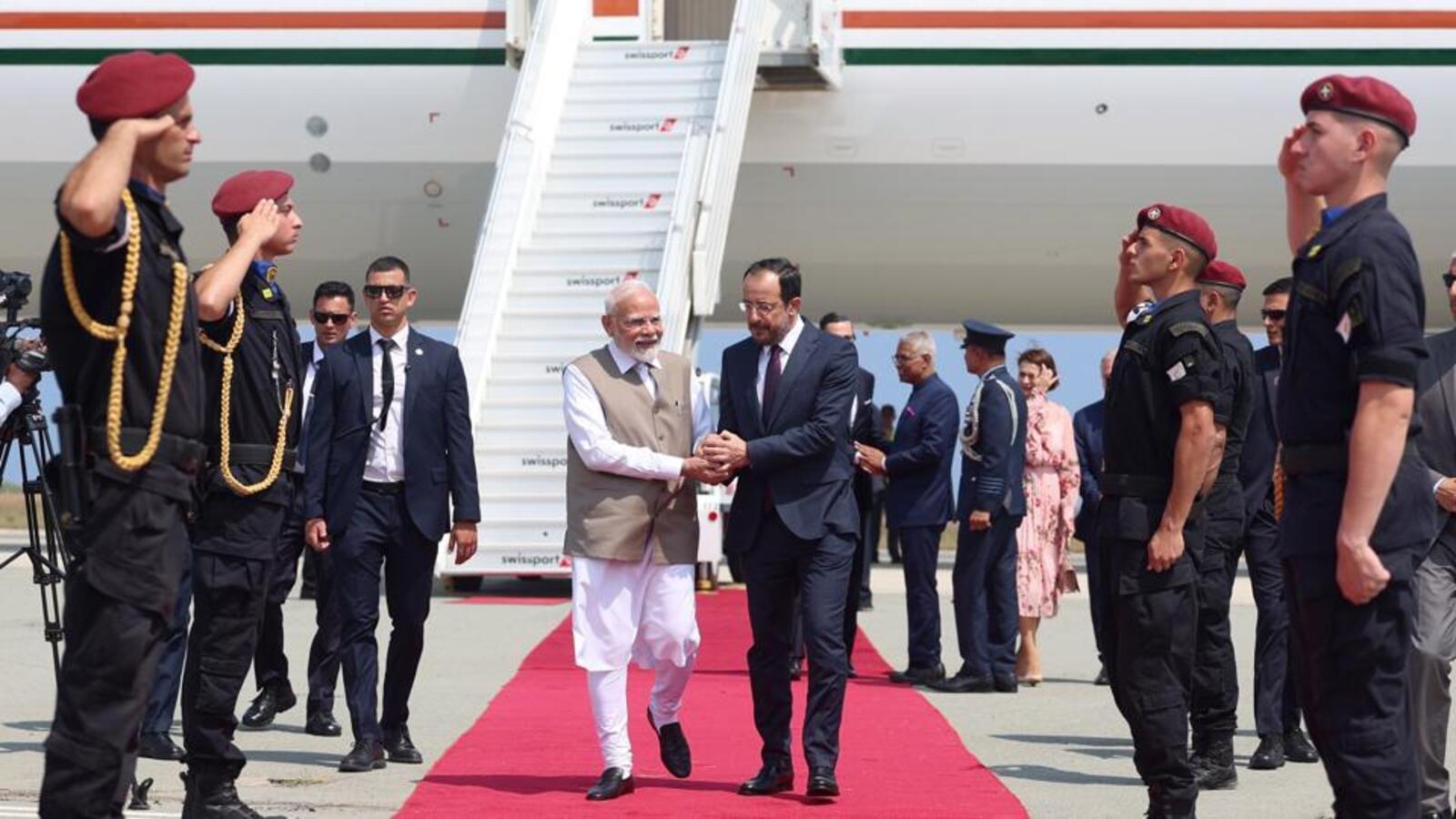New Delhi: Prime Minister Narendra Modi said on Sunday his three-nation tour of Cyprus, Canada and Croatia will help expand ties in trade, investment and security and galvanise global understanding on tackling all forms of terrorism.
 Prime Minister Narendra Modi being received by Cyprus President Nikos Christodoulides on his arrival at Larnaca International Airport, on Sunday. (DPR PMO)
Prime Minister Narendra Modi being received by Cyprus President Nikos Christodoulides on his arrival at Larnaca International Airport, on Sunday. (DPR PMO)
The visit is being closely followed as Modi is set to hold his first meeting with Canadian Prime Minister Mark Carney on the margins of the G7 Summit during the second leg of the tour. The meeting has been described by the Indian side as an opportunity to reset relations with Canada after a long-running diplomatic row over the killing of a Khalistani separatist in 2023.
Modi arrived in Cyprus late on Sunday afternoon, becoming the first Indian premier to visit the Mediterranean country in 23 years. The decision to travel to Cyprus on the way to Canada was influenced by Turkey’s support for Pakistan during last month’s clashes with India. Turkey recognises Northern Cyprus, comprising territories seized by Turkish forces in 1974, while India has maintained close ties with the Republic of Cyprus.
In a statement issued ahead of his departure from New Delhi, Modi described Cyprus as a close friend and important partner in the Mediterranean region and the European Union (EU). He said: “The visit provides an opportunity to build upon the historical bonds and expand our ties in the areas of trade, investment, security, technology and promote people-to-people exchanges.”
Modi is scheduled to hold talks with President Nikos Christodoulides in the capital Nicosia and address business leaders in Limassol.
He is scheduled to travel from Cyprus to Kananaskis, Canada, on Monday to attend the outreach session of the G7 Summit on June 17. “The summit will provide space for exchange of views on pressing global issues and the priorities of the Global South,” Modi said, adding that he planned to engage with leaders from partner countries in Canada.
On June 18, Modi will visit Croatia for meetings with President Zoran Milanovic and Prime Minister Andrej Plenkovic. “Both our countries enjoy centuries-old close cultural links. As the first visit by an Indian Prime Minister to Croatia, it will open new avenues for bilateral cooperation in areas of mutual interest,” he said.
This three-nation tour is an opportunity to thank partner countries “for their steadfast support to India in our fight against cross-border terrorism, and to galvanise global understanding on tackling terrorism in all its forms and manifestations”, Modi said.
The Canada leg of the tour will be followed with most interest in view of the sharp deterioration in relations with India over the past two years. The external affairs ministry said Modi’s meeting with Carney on the margins of the G7 Summit will be an opportunity to reset India-Canada relations based on “mutual respect, shared interests and sensitivity to each other’s concerns”. This will also be Modi’s first visit to Canada in a decade.
India-Canada ties nose-dived when former Canadian prime minister Justin Trudeau alleged in September 2023 that Indian agents were linked to the murder of Khalistani separatist Hardeep Singh Nijjar. India dismissed the charge as “absurd” and subsequently accused the Canadian government of giving space to separatists and radical elements that pose a threat to Indian diplomats and interests.
As bilateral ties hit an all-time low over the past year, both sides expelled diplomats and downgraded ties. Modi and Carney had their first phone call on June 6, when the Indian leader accepted an invitation to attend the G7 Summit. The two sides are also close to appointing new envoys to each other’s capitals.
Following Carney’s appointment on March 14, the two sides have been in touch at the level of leaders and senior officials. There have also been meetings between senior security officials, including the National Investigation Agency (NIA) on the Indian side and the National Security Intelligence Advisor, Royal Canadian Mounted Police, and Canadian Security Intelligence Services on the Canadian side.
